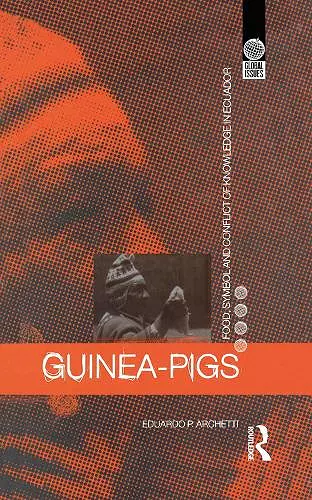Guinea Pigs
Food, Symbol and Conflict of Knowledge in Ecuador
Format:Hardback
Publisher:Taylor & Francis Ltd
Published:1st May '97
Currently unavailable, and unfortunately no date known when it will be back
This hardback is available in another edition too:
- Paperback£37.99(9781859731192)

Also available in paperback, 9781859731192 GBP17.99 (September, 2001)
Guinea pigs have been reared and eaten by indigenous people in the Andes since ancient times, and it seemed rational to development planners to ‘modernize' their production.Guinea pigs have been reared and eaten by indigenous people in the Andes since ancient times, and it seemed rational to development planners to ‘modernize' their production. When these development projects ran into trouble, a team of anthropologists was invited to study the reasons for this lack of success. This intriguing book is the product of that study.What the author shows is that guinea pigs have a meaning in the social and ritual life of Ecuadorian peasants which is far from mundane. Rejecting the attempts of some anthropologists to reduce the production of guinea pigs and the festive life of the Andean community to a quest for protein, he explores the full complex of social and cultural practices which centre on this animal, and uses his study of its role within Andean culture to provide telling insights into how that culture itself is constituted -- its values, beliefs and attitudes. By working in a variety of communities with different ecological and ethnographic characteristics, the author has made a major contribution to ethnographic accounts of Ecuador and to the more general study of ritual, consumption and indigenous knowledge. He points us, in particular, towards the importance of the knowledge of women, who are those principally responsible for the care of an animal which is prized for its role in healing and central to Andean sociality. The book not only presents us with a colourful description of the range of cultural practices surrounding the guinea pig, ranging from the way the animals are reared, through a rich and complex cuisine, to their role in ritual life, but also highlights the way the gender dimension is central to understanding resistances to ‘modernization' and the power of ‘experts'.
'The book is a useful first reference to the important concepts in the human-animal relationship and will no doubt raise many questions which may stimulate the reader to delve further into the topics.'Anthrozoos'Provides intriguing information.'TLS'This book is an important addition to both Andean and Latin American anthropology. The author has made a significant contribution to the general study of ritual, consumption and indigenous knowledge. Moreover, the book is short, easy to read and impeccably translated.'Cambridge Anthropology'Anybody who has read Eduardo Archetti's marvellous social history of the guinea-pig (Archetti, 1997) will realize that his work is not easy to pigeonhole.'Critique of Anthropology, reviewing Masculinities: Football, Polo and the Tango in Argentina
ISBN: 9781859731147
Dimensions: unknown
Weight: 453g
168 pages